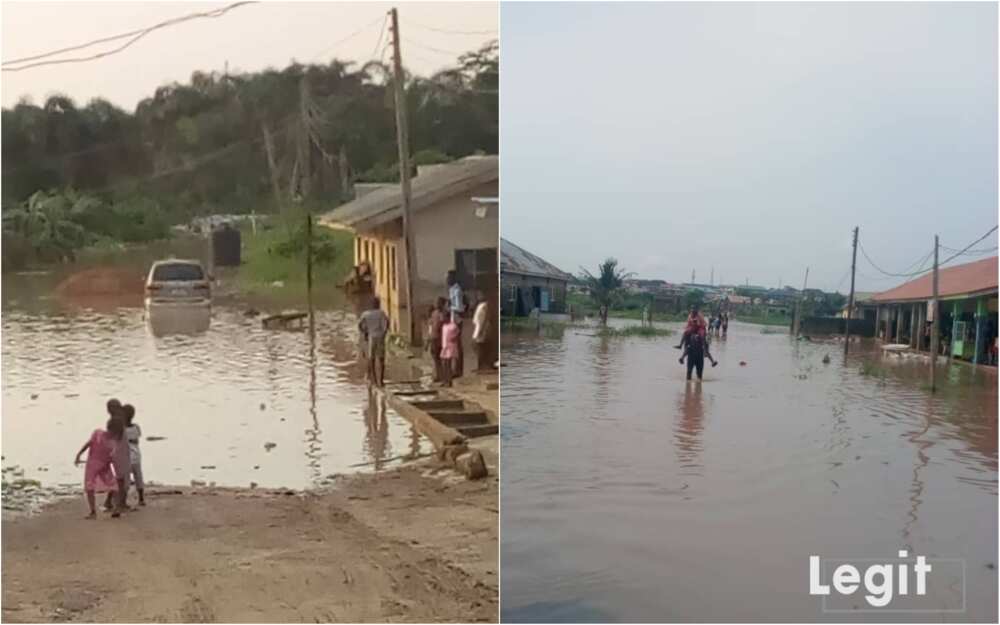As Flood Ravages 34 States in Nigeria, UNICEF Gives Details of Children Affected, Way Forward
- The flooding ravaging states in Nigeria have left many including children in extremely vulnerable situations
- Children affected by the floods are said to be at high risk of being drowned or contracting waterborne diseases
- To address the situation, UNICEF has called for increased funding channelled towards interventions that would meet the immediate needs of the children and other vulnerable groups
PAY ATTENTION: Сheck out news that is picked exactly for YOU ➡️ find the “Recommended for you” block on the home page and enjoy!
With flood ravaging at least 34 out of the 36 states across Nigeria and the Federal Capital Territory, the United Nations Children Fund has warned that a total of 1.5 million children are at an increased risk of facing dire effects of the humanitarian crisis.
In a statement released on Friday, October 21, UNICEF reeled out some of the dangers faced by the children affected by the flooding including waterborne diseases, drowning and malnutrition.

Source: Original
According to the international agency, these children represent 60 percent of the entire population of 2.5 million Nigerians who are in dire need of humanitarian assistance due to the flooding.
Describing this year's incident as the most severe flooding in the past decade, UNICEF said that while 600 people have lost their lives, 200,000 houses have either been partially or fully damaged.
PAY ATTENTION: Share your outstanding story with our editors! Please reach us through info@corp.legit.ng!
In addition, it stated that 1.3 million have been displaced since the first report of the flood this year with cases of diarrhea and water-borne diseases, respiratory infection, and skin diseases already on the rise.
Children living in extremely vulnerable situations due to flooding
UNICEF Representative in Nigeria, Cristian Munduate, expressed worry that children and adolescents in the flood-affected areas across the country are in an extremely vulnerable situation at the moment.
Munduate said this population of Nigerians are at risk of contracting the waterborne disease and as well suffering emotional and psychological distress.
Her words:
"UNICEF is working closely with the government and other partners to provide life-saving assistance to those who are most in need.”
She added that the floods are contributing to a different level of the complex and already existing humanitarian crisis situation in Nigeria.
Calling for a focus on the immediate priority needs for children which include health, water, sanitation, and hygiene; as well as shelter and food, UNICEF said additional funding and resources are required to respond to growing needs that could help sustain ongoing humanitarian interventions. Such interventions, the agency said must focus on the most vulnerable, including children with disabilities.
In addition, UNICEF’s Children's Climate Risk Index (CCRI) states that Nigeria is considered at 'extremely high risk of the impacts of climate change. The country ranks second out of 163 countries.

Read also
Maintain proper water runoffs: 4 steps Nigerians can take to prevent home flooding in 2022 in any place
Children in 'extremely high risk' countries face a deadly combination of exposure to multiple climates and environmental shocks combined with high levels of underlying child vulnerability, due to inadequate essential services, such as water and sanitation, healthcare, and education.
It added that to date, UNICEF has supported the government response in three affected States -Jigawa, Niger, and Kaduna, including through the provision of cash assistance, distribution of cholera kits, government-led mobile health teams, temporary learning centres, and learning kits and cholera kits.
With this additional support, UNICEF can scale up its response in other states to provide lifesaving medical equipment and essential medicines, chlorination of water and sanitation supplies, as well as to support the prevention of and response to sexual and gender-based violence.
Flood crisis in some states to force Nigeria's inflation rate higher
Food inflation in Nigeria is expected to further increase as a result of the heavy floods in some states.
Nigeria's inflation rate increased by 20.8% in September from 20.52% in August, the highest rate since 2005.
"Going by what we are experiencing in Benue, Kogi and others, food prices will further increase as a result of the heavy floods that have destroyed farmlands," an expert had said.
United States Promises $1 million for Nigeria’s flood victims, fears surge of waterborne diseases
The US government had promised $1 million in humanitarian assistance to Nigerians affected by unprecedented flooding.
The support will provide emergency shelter assistance, relief commodities, and hygiene kits to promote safe and healthy practices amongst other benefits.
"We are also concerned that standing floodwaters could increase the risk of cholera and other waterborne diseases in Adamawa, Borno and Yobe states," Leonard said.
Source: Legit.ng



